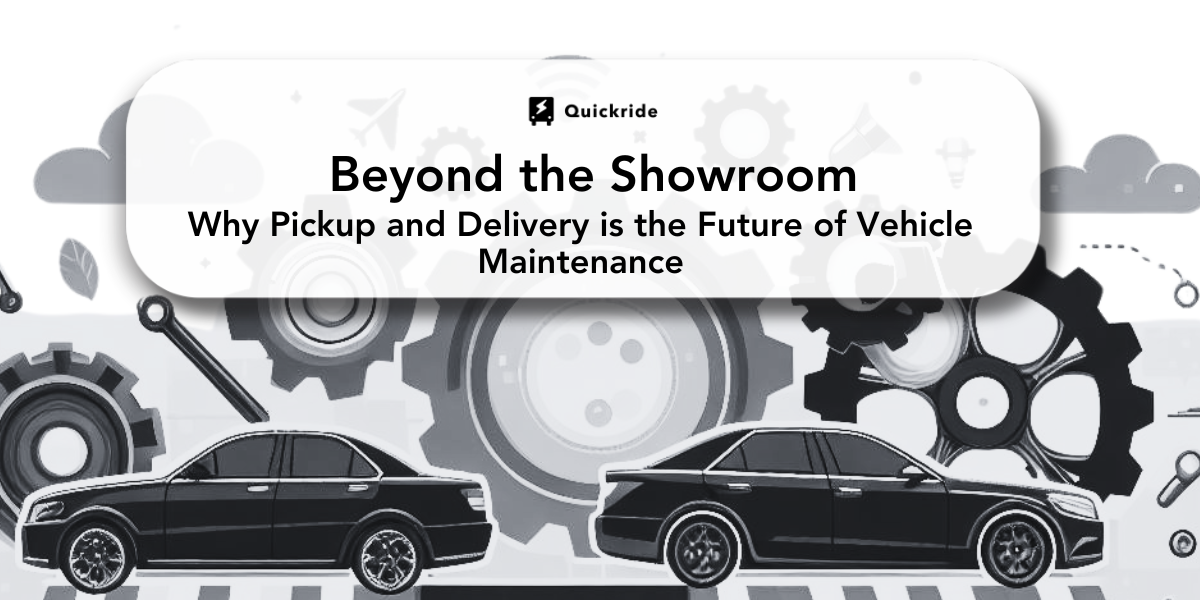Introduction
The way consumers interact with car dealerships and receive services has fundamentally changed over the past decade. Customers increasingly expect fast, convenient, on-demand experiences across industries, and customer expectations are rapidly evolving. This has major implications for how auto repair shops, dealerships, and other service providers need to adapt.
Exploring shifting customer preferences in the vehicle service industry, especially the growing demand for convenience and immediacy, is a new priority. Leading service providers are already responding by offering pick-up and delivery options, remote appointment booking, real-time status updates, and expanded service hours. Adapting to these changing expectations is key for companies in this industry to boost customer satisfaction and build loyalty.
Additionally, it is time to discover specific service offerings that customers now expect, look at why meeting these new demands is critical, and explore what the future may hold for the vehicle service experience. The landscape is changing quickly, and providers will need to evolve to continue exceeding customer expectations.
Demand for Convenience
Customer expectations have shifted dramatically in recent years. People today want services on their schedule, with far less willingness to wait or be inconvenienced in any way. There is an expectation for experiences that are fast, flexible, and highly customized to individual needs and preferences.
Gone are the days when customers would simply accept an appointment time slot that was most convenient for the business. Today's customers expect options that fit their busy lifestyles, on their terms. Walking into a service center and waiting for assistance is no longer acceptable. Customers want to complete tasks on their own timetable, not the company's.
This demand for convenience spans all industries, but is especially pertinent for vehicle-related businesses. Customers have little tolerance for dropping off a car, waiting around, making multiple trips, and working solely around the shop's availability. The growth of on-demand services in other sectors has accelerated these expectations. In the minds of today's consumers, convenience is now a fundamental part of a quality experience.
Businesses that do not adapt to these shifting preferences risk losing customers to competitors that do offer greater flexibility and customer-centricity. As consumer behaviors evolve, vehicle service providers must as well. The future belongs to those companies that find ways to meet the demand for convenience.
Pick-Up and Delivery Services
One of the biggest shifts in customer expectations is the demand for more convenient pick-up and delivery of vehicles for service and repair. Offering pick-up and delivery enables customers to drop off and pick up their vehicles according to their own schedule, without having to coordinate trips to and from the shop.
This saves customers valuable time and increases their satisfaction with the service experience. No longer does a customer need to arrange rides or time off work to bring in their vehicle or pick it up when the work is completed. With pick-up and delivery, the entire process is flexible and tailored around the customer's schedule.
Many service shops are now providing free pick-up and delivery within certain mile radiuses. Some are partnering with third party services to handle transportation logistics. This flexibility and convenience is becoming an expected part of the service experience. Customers today want control over when their vehicle is picked up and returned back to them.
Remote Appointment Booking
Advances in technology have enabled customers to book vehicle service appointments entirely online or through a mobile app, without ever having to pick up the phone or visit in person. This remote booking capability provides several key benefits:
- Convenience and flexibility - Customers can book appointments according to their own schedule. No more waiting on hold or negotiating the shop's availability over the phone.
- Reduced waiting times - With appointments booked in advance, customers can arrive at their designated time instead of waiting for the next available opening. Some shops even allow customers to check real-time shop traffic before booking.
- Less phone tag - Remote booking eliminates all the back-and-forth phone calls involved in scheduling appointments. Customers simply select a day/time on their own.
- Appointment reminders - Customers receive automatic email or text reminders about upcoming appointments, reducing no-shows.
- Paperless process - All appointment details, forms, authorizations, and communications are handled electronically, for a seamless experience.
For today's on-demand consumer, the ability to book a service appointment anytime from their smartphone delivers the ultimate in convenience. This innovation helps dealerships meet customer expectations and remain competitive in a digital-first marketplace. Eliminating phone calls and waiting times results in greater customer satisfaction.
Vehicle Status Updates
As customers' lives get busier, their tolerance for waiting around decreases. When a customer drops their vehicle off for service, there can be a lot of uncertainty around when the work will be completed. This leads to frustration as customers feel disconnected from their vehicle and repair process.
Providing real-time status updates helps bridge this information gap. Through text or email notifications, customers can receive ongoing progress reports on their vehicle service. This improves communication and transparency from the moment the vehicle enters the shop until it's ready for pickup.
The benefits are multifold - customers feel informed and empowered. By receiving regular updates, they no longer have to wonder what's happening behind-the-scenes or worry that their vehicle has been overlooked. Automated updates also free up service advisors from fielding frequent customer inquiries. This streamlines operations while still keeping customers in the loop.
Overall, status updates create a smoother, more relaxing service experience. Customers appreciate knowing their vehicle repair is actively being handled and they'll be contacted as soon as it's completed. This convenient communication reduces customer anxiety and builds trust. As consumer expectations advance, real-time status updates are becoming an invaluable part of quality vehicle service.
Expanded Service Hours
As customer expectations evolve, many auto service providers have adapted by expanding their hours of operation. This includes offering evening and weekend service hours to better accommodate today's varied customer schedules and lifestyles.
Expanded service hours provide customers with greater flexibility and access. By staying open later during the week and also opening for at least part of the weekend, auto service shops allow busy customers to get their vehicles serviced and repaired at times that work with their schedule.
For example, instead of having to take time off work and bring in their vehicle during regular business hours, customers can now schedule appointments during early morning, evening or weekend hours. This avoids having to disrupt the workday.
Expanded hours cater to customers who simply can't bring in their vehicle on short notice during the standard 9-to-5 timeframe when they are also trying to manage other responsibilities. The additional availability after traditional closing times or on Saturdays and Sundays gives customers more options and makes the process of maintaining a vehicle more convenient.
Meeting Evolving Expectations
As customer expectations for vehicle services continue to evolve, auto service providers need to adapt their processes, staffing, and technology to keep pace. Investing in improvements to the customer experience has become a top priority.
To meet the demand for more convenience and flexibility, shops are cross-training staff and expanding operating hours. Service advisors are receiving coaching to improve communication skills and provide updates to customers through their preferred channels, whether phone, text, email or an online portal. Training focuses on providing clarity, setting proper expectations, and maintaining a friendly tone.
Behind the scenes, auto service businesses are upgrading systems to enable features that customers now expect as standard - online appointment scheduling, mobile payment, vehicle status updates, and customer satisfaction surveys. These capabilities require investments in software, hardware, and integration.
When done right, these enhancements lead to higher satisfaction scores and customer loyalty. They also allow service staff to focus on quality vehicle repairs rather than administrative tasks. As consumer expectations evolve, leading auto service providers will continue adapting their businesses to deliver exceptional customer experiences.
The Bottom Line
Meeting shifting customer expectations is no longer an option, but a requirement for success. While change can be daunting, adaption is key for any business looking to not just survive but thrive.
Offering conveniences like at-home services and expanded hours addresses customer needs and enhances satisfaction. This provides a powerful competitive edge to win market share from competitors failing to evolve.
Prioritizing customer convenience isn't just good business, it's good retention. Buyers today have more choices than ever before. Brand loyalty now depends on delivering a superior experience on their terms.
Businesses unwilling to adapt to new expectations risk losing customers to more accommodating competitors. On the other hand, those embracing change position themselves for growth by providing greater satisfaction. This builds loyalty and makes it easier to attract new customers.
The bottom line is that customer expectations will continue to evolve. Keeping pace with change has become essential to remain relevant and maximize success. The future belongs to the flexible.
Looking Ahead
Customer expectations and needs will continue to evolve rapidly in the years ahead. As new technologies enable more on-demand and personalized experiences across industries, customer service in the automotive sector will need to adapt as well.
Some key trends to watch that will shape future customer demands:
- Continued evolution of customer expectations - Customers today expect businesses to be available 24/7. Things like same-day appointments, mobile check-in, and automated updates on vehicle status will likely become standard expectations. Customers will demand even faster turnaround times and more flexibility.
- Technology shaping on-demand experiences - Emerging technologies like AI and advanced telematics will enable automotive businesses to provide instant status updates, predictive maintenance scheduling, and customized recommendations for each customer. Customers will expect service departments to leverage technology to deliver hyper-personalized experiences.
- Flexibility and personalization - Customers will increasingly expect every interaction to be tailored to their needs and preferences. Things like flexible pick-up and drop-off windows, personalized maintenance recommendations, and customized pricing and packages will become the norm. Vehicle servicing will need to feel bespoke.
Overall, the customer experience will only get more personalized, responsive, and streamlined thanks to new innovations. Service departments that can adapt quickly and provide customized end-to-end experiences will be best positioned to meet rising customer demands in the years ahead.
Conclusion
As we've discussed, customer expectations for vehicle services are rapidly evolving. Consumers today demand greater convenience, including services like pick-up and delivery as well as expanded hours of operation. While meeting these new demands requires adaptation, auto service providers that embrace the change are seeing increased customer satisfaction.
The key points we covered were:
- Customers expect to book appointments and check vehicle status remotely. Mobile apps and text updates are becoming the norm.
- Offering pick-up and delivery is now a critical part of the service experience. Busy customers appreciate the convenience.
- Extended service hours accommodate today's on-the-go lifestyles. Weekend and evening options are increasingly expected.
To continue succeeding in the future, businesses must listen to customer needs and evolve accordingly. The auto service providers that proactively adapt to offer greater convenience and flexibility are most likely to thrive. Although change can be challenging, it presents opportunities to improve operations and better satisfy consumers. By embracing evolving expectations, auto service providers can build loyalty and stand out from the competition.
By embracing evolving expectations and integrating services like Quickride into their operational plans, auto service providers can build loyalty and stand out from the competition.
Therefore, we highly recommend incorporating Quickride's services as a significant part of your car dealership's innovation plan. Try Quickride for yourself to see the difference it can make in your operations, customer satisfaction, and bottom line. Click here to get your 30-day free trial - you're less than 10 minutes away from enhancing your processes and eliminating wait times in your lounge forever. Let Quickride be the transformative change your dealerships need.


